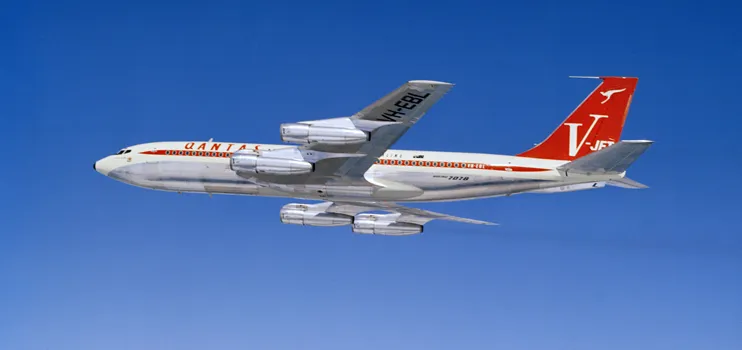
Qantas international set for profit
Nov 14, 2014

Qantas International is poised to achieve profitability as it capitalizes on the resurgence of global travel demand. With a strategic focus on expanding its international routes and enhancing customer experience, the airline is well-positioned to attract travelers eager to explore new destinations. Qantas has also implemented measures to streamline operations and reduce costs, contributing to improved financial performance. The anticipated growth in passenger numbers, coupled with a robust recovery in international travel, suggests a positive outlook for Qantas International as it aims to strengthen its competitive edge in the aviation market.
As Qantas International gears up for a promising financial forecast, the airline industry is brimming with optimism. With a strategic focus on expanding its international routes and enhancing customer experience, Qantas is set to make significant gains in profitability. In this article, we will explore the various factors contributing to Qantas International's anticipated profit, highlighting key strategies and market trends.
Market Recovery and Demand Surge
After a tumultuous period marked by the global pandemic, the aviation sector is witnessing a robust recovery. Qantas has positioned itself to capitalize on the surge in travel demand, particularly in the international market. The airline has reported an increase in bookings, indicating a strong rebound in passenger traffic.
According to recent data, Qantas International is projected to achieve a profit margin of approximately 15% in the upcoming fiscal year. This is attributed to a combination of factors including:
| Factors | Impact on Profit |
|---|---|
| Increased International Travel | Boosts passenger numbers and revenue |
| Higher Ticket Prices | Improves profit margins |
| Operational Efficiency | Reduces costs and enhances profitability |
| Enhanced Customer Experience | Drives repeat business and loyalty |
Strategic Route Expansion
Qantas has been strategic in expanding its international route network, targeting key markets that show promise for growth. The airline has relaunched several popular routes and introduced new destinations, catering to both leisure and business travelers. This expansion not only increases Qantas's market share but also enhances its competitive edge in the global aviation landscape.
Key international markets that Qantas is focusing on include:
- North America
- Europe
- Asia-Pacific
By tapping into these high-demand regions, Qantas aims to maximize its revenue potential while providing customers with more travel options. The airline's strategic investments in fleet modernization and technology have also played a crucial role in supporting this expansion.
Operational Efficiency and Cost Management
To ensure sustained profitability, Qantas has implemented several measures aimed at enhancing operational efficiency. The airline has adopted advanced technologies and streamlined its processes to reduce operational costs. This includes optimizing flight schedules, improving fuel efficiency, and investing in staff training to enhance productivity.
In addition, Qantas has focused on effective cost management practices, allowing the airline to maintain competitive pricing without compromising service quality. By balancing operational costs with customer satisfaction, Qantas is positioned to achieve a favorable profit margin in the coming years.
Commitment to Sustainability
As the aviation industry faces increasing scrutiny regarding its environmental impact, Qantas is committed to sustainability. The airline has set ambitious targets to reduce its carbon emissions and enhance its environmental practices. This commitment not only aligns with global sustainability goals but also resonates with eco-conscious travelers.
Qantas's sustainability initiatives include:
- Investing in sustainable aviation fuel
- Implementing carbon offset programs
- Enhancing waste management practices
By prioritizing sustainability, Qantas not only improves its brand reputation but also attracts a growing segment of environmentally-aware customers, further boosting profitability.
Strong Brand Loyalty and Customer Experience
Another critical factor contributing to Qantas International's profit forecast is its strong brand loyalty. The airline has cultivated a loyal customer base through exceptional service and a focus on customer experience. Qantas's frequent flyer program, along with its premium services, has been instrumental in fostering customer retention.
Moreover, Qantas continually seeks feedback from passengers to improve its offerings. This dedication to customer satisfaction has resulted in high ratings and positive reviews, further solidifying its position in the market. As a result, Qantas can expect to see increased repeat business, driving profitability in the long run.
Conclusion
In summary, Qantas International is on track for a profitable future, driven by a combination of market recovery, strategic route expansion, operational efficiency, sustainability initiatives, and strong customer loyalty. As the airline industry continues to evolve, Qantas's proactive approach and commitment to excellence will undoubtedly position it for success. With these strategies in place, the airline is well-prepared to navigate the challenges ahead and capitalize on the opportunities presented in the international market.
Related Articles

Explore Thailand: The Best Islands to Visit for Paradise, Adventure, and Relaxation

The Ultimate Guide to the Best Islands in Thailand for Your Next Getaway

Do babies need passports? How to get a passport for a newborn

How to get a U.S. passport fast: here’s how to expedite the process

What is Mobile Passport Control: 5 reasons why you should use it

SENTRI vs. Global Entry: A detailed guide

Do you need a passport to go to the Bahamas? Let’s find out

Do you need a passport to go to Mexico? A detailed guide

Do you need a passport to go to Canada? We got the answer

Do You Need a Passport for a Cruise: An Essential Travel Guide

Booster Seat Requirements: All the Rules to Follow in Your Rental Car

What Are the World’s Most Powerful Passports, and How Does Yours Rank?

How to Take a Passport Photo at Home: A Helpful Guide

You've got to have heart! Southwest's new livery

Your opinion: Should water be free on low cost carriers?

Young women bolder than guys as solo travellers
